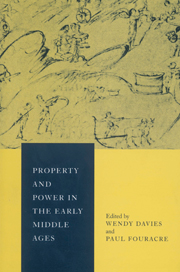Book contents
- Frontmatter
- Contents
- List of maps
- Preface
- List of abbreviations
- Introduction
- 1 The ideology of sharing: apostolic community and ecclesiastical property in the early middle ages
- 2 Teutsind, Witlaic and the history of Merovingian precaria
- 3 Eternal light and earthly needs: practical aspects of the development of Frankish immunities
- 4 The wary widow
- 5 Lordship and justice in the early English kingdom: Oswaldslow revisited
- 6 Adding insult to injury: power, property and immunities in early medieval Wales
- 7 Property transactions and social relations between rulers, bishops and nobles in early eleventh-century Saxony: the evidence of the Vita Meinwerci
- 8 Monastic exemptions in tenth- and eleventh-century Byzantium
- 9 Property ownership and signorial power in twelfth-century Tuscany
- 10 Conclusion: property and power in early medieval Europe
- Glossary
- List of works cited
- Index
8 - Monastic exemptions in tenth- and eleventh-century Byzantium
Published online by Cambridge University Press: 25 January 2010
- Frontmatter
- Contents
- List of maps
- Preface
- List of abbreviations
- Introduction
- 1 The ideology of sharing: apostolic community and ecclesiastical property in the early middle ages
- 2 Teutsind, Witlaic and the history of Merovingian precaria
- 3 Eternal light and earthly needs: practical aspects of the development of Frankish immunities
- 4 The wary widow
- 5 Lordship and justice in the early English kingdom: Oswaldslow revisited
- 6 Adding insult to injury: power, property and immunities in early medieval Wales
- 7 Property transactions and social relations between rulers, bishops and nobles in early eleventh-century Saxony: the evidence of the Vita Meinwerci
- 8 Monastic exemptions in tenth- and eleventh-century Byzantium
- 9 Property ownership and signorial power in twelfth-century Tuscany
- 10 Conclusion: property and power in early medieval Europe
- Glossary
- List of works cited
- Index
Summary
The nature of Byzantine exemptions has long been the subject of debate. In the recently published Oxford Dictionary of Byzantium, Mark Bartusis was suitably cautious in his entries on exemption and the word usually used to identify it: exkousseia. He identified two areas of controversy. Firstly, whether exkousseia should be identified with ‘Western concepts of immunity’, which ‘always imply judicial immunity’, or should simply be seen as ‘a type of exemption from certain obligations of the state and from introitus, the entry of officials into estates’. As Bartusis put it: ‘Some scholars in fact consider the application of the Western medieval concept of immunity to Byzantium as inappropriate and misleading and prefer the more limited concept of exemption’. Secondly, given that exkousseia always involved freedom from fiscal burdens – so much is agreed – did it imply exemption from the telos, the totality of charges in cash and kind for which landowners were liable, or simply from the epereiai, a word used from the tenth century onwards to describe extraordinary state requisitions in cash or kind, usually required by state officials (especially the military) sent from Constantinople, but sometimes demanded by local administrators?
- Type
- Chapter
- Information
- Property and Power in the Early Middle Ages , pp. 200 - 220Publisher: Cambridge University PressPrint publication year: 1995
- 3
- Cited by



